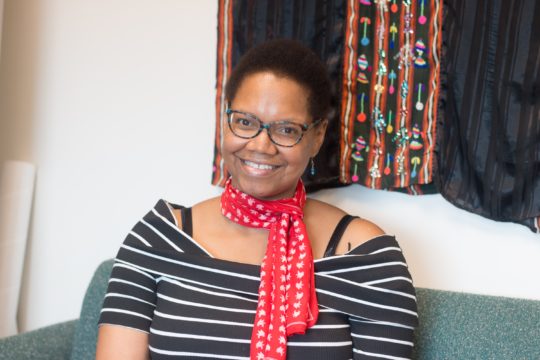
Photo by Anton Zemba.
The assumption that there is a universal and singular experience as a womxn erases the nuances and variety that exists. This column seeks to address the many intersections that overlap in an individual’s life. All this is done in an effort to celebrate the reality of womxnhood in the various ways it may be expressed.
Professor Carla Daughtry never imagined she would be a teacher, especially in a place like Appleton. Her lifelong attraction to the unfamiliar has given her a natural openness to new experiences that have, more often than not, been immensely rewarding to her.
Professor Daughtry can pinpoint exactly what made her the person she is today: “I grew up in multiple locations and places,” she explained. “My father[‘s career] in the Air Force caused us to move around — I was born in California, we lived in Texas, then upstate New York…” Alabama became home for a time, first in the metropolitan area and then the “deep-country backwoods” where Professor Daughtry began her schooling. Later, Ohio, Maryland and Washington D.C. became momentary homes that added to her experience as a young traveler.
The process of moving and settling the family throughout her childhood made Professor Daughtry the perpetual new kid in the neighborhood. The anxiety that a child might naturally feel at the idea of new people in new social settings is particularly sharp when paired with being the new African American girl in predominately white areas. Discomfort with such hyper-visibility was a familiar feeling for a time before it suddenly stopped hurting as much. Daughtry learned to stop feeling the weight of the stares. Once she found a silver lining in her uprooting, it was difficult to see past the chance for renewal.
“I saw leaving as an opportunity to escape and explore,” Professor Daughtry said. “I loved moving; it gave me this wanderlust, this travel bug! I always wished [my family] got to travel abroad.”
Her eventual career as an anthropologist gave Professor Daughtry plenty of opportunity to travel outside the United States. She can still recall the excitement she felt when leaving the country for the first time to study abroad in Cairo, Egypt, as a college junior. “I thought I was going home to the motherland, back to Africa,” she admitted. Instead, Professor Daughtry landed in a country of people that retained a distinct cultural identity that separated them from the rest of the continent. Instead of being disappointed, Professor Daughtry left with an experience that fundamentally changed her.
“[The trip] opened up my worldview on notions of race and gender,” she explained. “It toppled my idea that Blackness and race were the same around the world. It got me interested in race as a cultural and social convention defined differently depending on the societal and historical context.”
A young Professor Daughtry may have precociously acted as an anthropologist in her own right, but the work she completed as an adult required her to rewrite her previous outlook towards new people and new places. The variety of differences she saw throughout the United States only intensified during her global travels, but she had to work against the human tendency to see through the cultural lens one is familiar with. Her American-centric perspective could have clouded her studies if she were not committed to always actively engaging and appreciating how people interpret the world differently.
Professor Daughtry is among the generations of anthropologists who follow Ruth Benedict’s example and work to move away from the historical elitism and racism the field originated with. Benedict’s anthropologic methodology focused on making the world safer for diversity — the notion revitalized the field. While the current state of the field no longer resembles its past, Professor Daughtry hopes for more change: “We’re still sending people from the West to other places. That’s not equity. We’re not seeing non-Western anthropologist studying us.”
“I’m proud to be an anthropologist of color,” continued Professor Daughtry. “There’s [certainly] more diversity. There are more womxn in anthropology, but there needs to be an overturn of the Western assumption in the field.”
Professor Daughtry admitted that she does think of herself in terms of motherhood, family life and her work as an educator. She actively tries to declutter her life to ensure she has enough time for all of her responsibilities and combat against the Lawrentian habit to over-schedule.
Particularly as a mother of two biracial teenage boys, Professor Daughtry now finds herself thinking of their interactions with the world more and more: “We’ve already had a conversation, in a light-hearted fashion, about what to do with the police. I don’t know if they feel as hyper-visible as I [did]. We’ll be having more conversations.”
Outside of work and family, Professor Daughtry consciously tries to contribute to causes that empower womxn. She makes it a point to promote events for Harbor House — the domestic abuse shelter and advocacy agency here in Appleton — when she can. Being around a community of like-minded womxn has always inspired Professor Daughtry and continues to do so.
